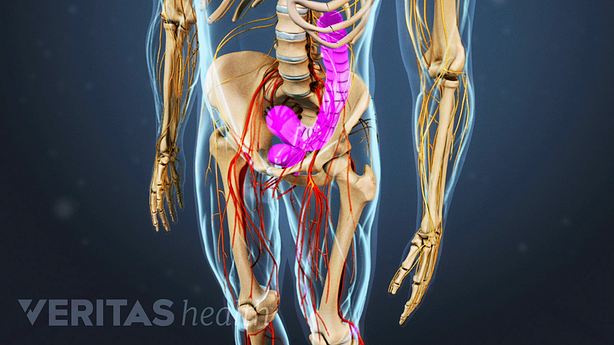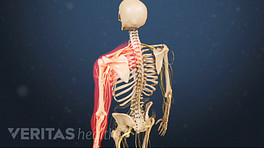Neck pain symptoms can vary widely. The pain may just be a mild nuisance, or it could be so excruciating that a person avoids any excessive movement.
Oftentimes neck pain is located in one spot and goes away on its own within a few days or weeks. Less commonly, the pain becomes constant and/or radiates into other body parts, such as the shoulder and arm.
In This Article:
Common Neck Pain Signs and Symptoms

Neck pain is commonly associated with stiffness, muscle spasms, and headaches.
Neck pain usually involves one or more of the following symptoms and signs:
- Stiff neck. Soreness and difficulty moving the neck, especially when trying to turn the head from side to side.
- Sharp pain. This pain may be localized to one spot and might feel like it is stabbing or stinging. This type of pain typically occurs in the lower neck.
- General soreness. This discomfort is typically felt in a broader area or region of the neck. It is described as tender or achy, not sharp.
- Radicular pain. This pain can radiate along a nerve from the neck into the shoulder and arm. The intensity can vary and this nerve pain might feel like it is burning or searing.
- Cervical radiculopathy. Neurological deficits—such as problems with reflexes, sensation, or strength—may be experienced in the arm due to nerve root compression. Cervical radiculopathy may also be accompanied by radicular pain.
- Trouble with gripping or lifting objects. This problem can happen if numbness or weakness goes into the arm or fingers.
- Headaches. Sometimes an irritation in the neck can affect muscles and nerves connected to the head. Some examples include tension headache, cervicogenic headache, and occipital neuralgia.
If neck pain symptoms progress, it can become difficult to sleep. Neck pain may also interfere with other daily activities, such as getting dressed or going to work, or any activity that involves turning the head, such as driving.
The onset of Neck Pain Symptoms

Symptoms of neck sprain can occur hours or days after an accident or injury.
Neck pain typically develops in one of the following ways:
- Slowly over time. Neck pain might start out as mild or only occur toward the end of a work day, but then it might recur and get worse with time.
- Immediately following an injury. For instance, neck pain could start right after a bike accident or having slept awkwardly on the neck.
- Delayed reaction after an injury. Neck sprain symptoms, such as after a car accident, might begin hours or a few days after the injury occurred. Some neck injuries can get worse over time.
- Suddenly without any prior signs. Sometimes neck pain can start in the middle of a normal day for no apparent reason.
Neck pain symptoms might be constant, go away quickly, come and go regularly, or return intermittently. Certain activities or movements, such as sneezing or coughing, could make the pain worse.
When Neck Pain Needs Medical Attention

Neck pain along with loss of bowel and bladder control requires immediate medical reaction.
While neck pain usually goes away on its own, sometimes an underlying cause must be treated in order to alleviate the symptoms. When neck pain continues to interfere with routine activities or persists for days without improvement, it is advisable to schedule a doctor appointment.
See Specialists Who Treat Back Pain
Sometimes neck pain is caused by a serious underlying medical condition, such as a spinal cord compression, cancer, meningitis, or any number of infections. Neck pain requires immediate medical attention if it is accompanied by any of the following:
- Radiating pain into both arms or legs (myelopathic pain)
- Numbness, tingling, or weakness in arms or legs
- Problems with balance or coordination
- Loss of bowel or bladder control
- Unintended weight loss
- Fever or chills
- Severe headache with stiff neck
See When Is a Stiff Neck Serious?
When severe neck pain results from major trauma, such as a car accident or falling from a ladder, it must be treated as a medical emergency. To reduce the risk for paralysis, the patient should be immobilized by a medical professional and then transported to emergency care.









